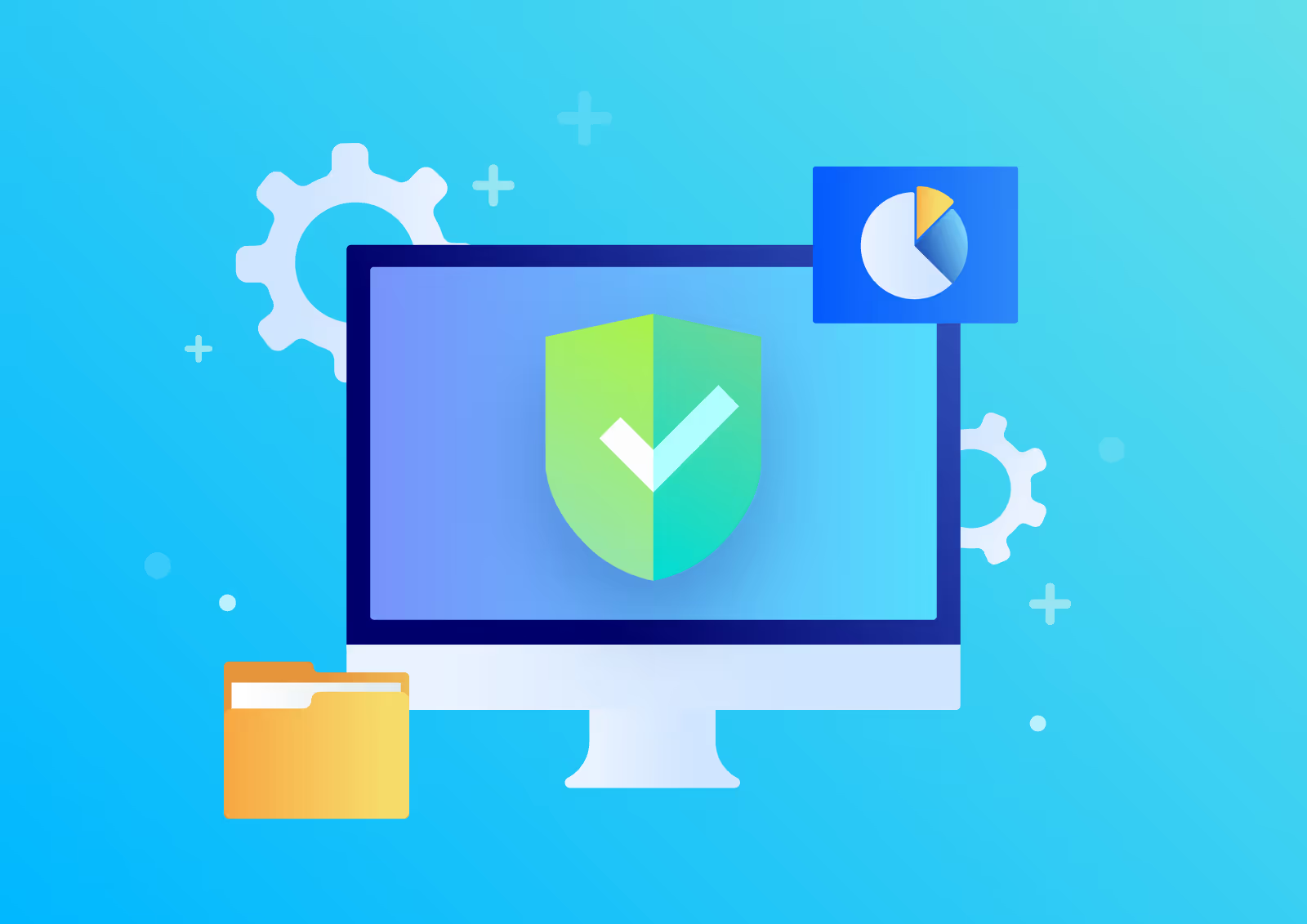3 Benefits of Multi-Company Accounting Software
Unlock the perks of multi-entity accounting solutions that allow you to automate a bunch of micro and small clients while still staying profitable.
This article outlines five vital strategies for safeguarding sensitive accounting data, ensuring its confidentiality and integrity remains intact.

The rise of digital technology has transformed the landscape of financial transactions and accounting procedures. Yet, this progression also introduces heightened risks of cyberattacks and data breaches. This article outlines five vital strategies for safeguarding sensitive accounting data, ensuring its confidentiality and integrity remains intact.
In this article
The rise of digital technology has transformed the landscape of financial transactions and accounting procedures. Yet, this progression also introduces heightened risks of cyberattacks and data breaches. Especially for businesses and accounting firms, the protection of client data extends beyond regulatory compliance; it's a crucial element of their operational integrity and the trust they hold with clients. Amid escalating cyber threats, the adoption of robust data security protocols is imperative. This article outlines five vital strategies for safeguarding sensitive accounting data, ensuring its confidentiality and integrity remains intact.

Understanding the critical importance of accounting data security is key before exploring specific protective strategies. Within the financial services industry, the safeguarding of data, a highly valuable asset, is paramount. This data encompasses sensitive details like bank account numbers, personal identification information, transaction records, and more. A compromise of this data can result in significant financial losses, legal consequences, damage to reputation, and erosion of client confidence. Therefore, for accounting firms, prioritizing data security goes beyond mere regulatory compliance; it's about the protection of their clients and the safeguarding of their business. Adhering to data security best practices in accounting software and systems, ensuring secure cloud-based accounting software, and maintaining physically secure computers are essential aspects of a robust financial data protection strategy in the financial services industry. This approach is not just a necessity but a fundamental responsibility to maintain the trust placed in these firms by their clients.
Cyber threats are constantly evolving, with hackers employing sophisticated methods to access unauthorized data. Phishing attacks, malware, ransomware, and insider threats are common tactics used to breach data security. The financial sector is particularly attractive to cybercriminals due to the nature and value of the data involved.
Implementing robust authentication methods stands as one of the best lines of defense against unauthorized access. This strategy involves setting up verification barriers to confirm user identities before allowing them access to sensitive information.
Multi-factor authentication (MFA) enhances security by necessitating that users present multiple forms of verification. This might involve a combination of something they know (such as a password or PIN), something they possess (like a smartphone or a security token), and something inherent to their identity (like a biometric marker, including a fingerprint or facial recognition). This method significantly reduces the risk of unauthorized access, as it's unlikely an intruder could simultaneously compromise multiple authentication factors.
Implementing strong password policies is crucial. Passwords should be complex, unique, and changed regularly. Educating employees about the importance of password security and enforcing policies that require strong passwords are fundamental steps in safeguarding data.
Access control is a critical component of data security in accounting. Not every employee needs access to all financial data or systems.
Role-Based Access Control (RBAC) restricts employee access to only those data and systems essential for their specific job roles. This approach significantly reduces the likelihood of both accidental and deliberate data breaches. Conducting frequent audits of access rights helps to discover and correct any improper access permissions, thereby guaranteeing that only those with proper authorization can access sensitive information.
Constant monitoring of who accesses what data and when is essential for detecting and preventing unauthorized access. Implementing software solutions that track and manage user access can be a key tool in this process.
Backing up data is a critical step in protecting against data loss due to system failures, cyberattacks, or other disasters.
Data should be backed up regularly and stored securely, either off-site or in the cloud. Cloud storage providers often offer robust security measures, including encryption and secure data centers. However, it's vital to choose providers with a strong track record of data security.
Encrypting data, both at rest and in transit, ensures that even if data is intercepted or accessed by unauthorized individuals, it remains unreadable and secure.

Hackers frequently target software vulnerabilities as a means to infiltrate systems unauthorizedly. To combat this, it's essential for businesses, especially accounting firms, to adopt a cybersecurity strategy that includes regularly updating all software with the latest patches. This practice, particularly vital for financial data software and antivirus programs, serves as a basic yet potent defense against such security threats, ensuring the protection of sensitive financial information and safeguarding the firm's financial assets.
Software vendors regularly release updates and patches to address security vulnerabilities. Ensuring these updates are applied promptly is crucial for maintaining software security.
Maintaining up-to-date antivirus and anti-malware software is essential to protect against malicious software that can compromise data security.
One of the largest vulnerabilities in data security stems from human error. Educating team members on data security best practices, such as identifying phishing schemes and correctly managing financial data, is crucial in mitigating data breach risks. This training is particularly vital in the financial services industry, where the protection of financial data is paramount. Ensuring that employees understand how to securely operate accounting systems, including cloud-based accounting software, and maintain physical security of computers, forms an integral part of a comprehensive strategy for accounting security and data protection. Regular, engaging, and up-to-date training sessions, and utilizing ai chat for on-demand guidance, can keep security at the forefront of employees’ minds. These security tips help fortify the overall defense against threats to sensitive information within accounting software.
Regular, engaging, and up-to-date training sessions can keep security at the forefront of employees' minds. These should cover the latest threats and the company's policies and procedures for protecting data.
Fostering a workplace culture where data security is a shared responsibility can lead to more vigilant and proactive security practices among all team members.
Cloud-based accounting software offers several advantages in terms of data security. When data is hosted in the cloud, service providers generally deliver robust security measures, encompassing consistent backups, sophisticated encryption methods, and secure data center facilities. Additionally, these cloud providers usually employ specialized security teams focused on vigilantly monitoring and addressing potential threats, often with a level of efficiency and expertise that surpasses what an individual organization might achieve on its own.

Selecting a reputable and reliable cloud-based accounting software provider is crucial. It's important to assess their security measures, compliance with regulations, and their track record in handling data breaches.
Cloud-based platforms provide advantages such as immediate data backups, remote accessibility, and the ability to scale with a business's expanding requirements. Nonetheless, it's crucial to recognize the shared responsibility framework in cloud security, which necessitates both the service provider and the user to actively participate in safeguarding data.
In summary, securing accounting data is a complex task demanding a holistic strategy. This approach involves a combination of robust technologies, vigilant practices, and collaborative efforts to ensure comprehensive protection of financial information. By implementing strong authentication methods, controlling access, ensuring regular backups, keeping software updated, and fostering employee awareness, accounting firms can create a robust defense against cyber threats. In a time when the repercussions of data breaches can be catastrophic, investing in data security transcends mere regulatory compliance and becomes an essential strategy for any business. The protection of accounting data goes beyond merely securing digital information; it is about upholding the financial integrity and trust that form the foundation of the accounting field. With the continual evolution of the digital world, it is imperative that both the strategies and technologies employed to safeguard financial data are consistently updated and adapted.